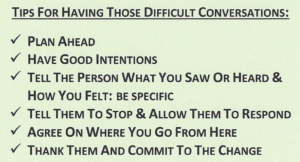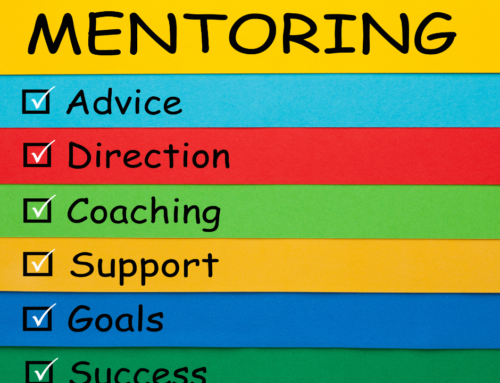Conversations as a Tool to Build Healthy, Productive Relationships
Almost everything we do depends on having conversations. People build friendships and get closer to other people through conversations. We understand other people’s feelings, and sometimes, it’s how we discover important things about ourselves.
It’s how we influence people and allow them to influence us.
Through conversations, we sort out our problems, cooperate with each other, and create new opportunities. Conversation is at the very heart of our lives, so it makes sense to try and be as good at them as we can. After all, a lot of anxiety, frustration, and people problems that we encounter in life have their roots in poor communication.
Improve Your Life at Work and Home
By getting better at how we understand and deal with people, we can enhance our lives and theirs. Even a few small changes can often lead to big differences.
Are you aware of what happens during satisfying and effective conversations?
Our bullying and harassment classes give us feedback after every class. Over the years they most often report that they learned
- To listen more
- To become better at communicating with colleagues
They normally had no idea where to start, until they learned about the Johari Window.
The Johari Window Helps Develop Conversational Skills
With an exercise that utilizes the principles of the JOHARI Window, we talk about the difference between how people think they are perceived versus how they are perceived by others.
It’s an eye-opening moment for those in the room when we are talking about respectful conduct, who then suddenly realize that there is a perspective they haven’t perhaps considered.
Becoming more self-aware is key.
And developing our conversation skills to be able to have more open and trusting conversations with people helps our awareness.
Think of all the conversations you have in a typical day—with both people you are comfortable and familiar with, and those you hardly know.
Some are enjoyable and lead to a satisfactory conclusion. In short, they work.
Others, however, go wrong. They may go around in circles or finish in an argument, or they may even just die before they get going.
I think I can safely say, we’d rather have the first kind of conversation.
Four Elements to a Good Conversation
In order to help us have those better conversations, let’s take a look at the four key elements that make up every good conversation:
- It feels like a genuine two-way experience with both of you equally involved and interested.
- You both feel you are being heard and understood by the other person, and there is a willingness on both sides to be open.
- The atmosphere in the conversation feels comfortable. So even if what you’re talking about is difficult, the important things get said and voiced.
- The conversation makes a difference. Something useful or satisfying happens as a result.
Elements to an Uncomfortable Conversation
Conversely, an unsatisfactory conversation feels more like a game of tennis, where the aim is to score points as one person wins at the other’s expense. Conversations like this are about competing rather than cooperating.
When asked what they think has occurred to make a conversation bad, people tend to say they felt they were:
- pressured
- feeling under attack
- patronized
- ignored
- having their opinions or feelings denied
- put down
- threatened
- lectured at
- given unwanted advice
- not getting a chance to speak or having their views trivialized
The saying, “Sticks and stones may break bones, but words can never harm me,” is completely wrong.
Words can lead to any number of negative emotions that probably get in the way of rectifying a bad conversation.
The golden rule to treat other people in the way that you want to be treated is incredibly powerful here.
So, let’s focus more on how to have those good conversations and develop better relationships in our workplaces.
Use R.E.S.P.E.C.T as your Golden Rule
First and foremost, I encourage you to build your conversations around respect.
You don’t always have to agree, but you must respect other people’s right to hold different points of view. Try your best to understand them in the same way that you would like to be understood yourself.
It’s also important to respect the other person’s feelings. Even when you need to discuss something that may not be pleasant to hear, anticipate how they will feel as a result. That way you can do your best to make your point in a way that still recognizes and respects their feelings.
This is key to demonstrating respect at work.
As in other blog posts, I like to use the neighborhood metaphor to describe the workplace.
If a neighbor is causing problems (loud music, junk spilling over to your property, etc.), of course, you can go straight to an authority figure.
But, in most non-emergency situations consider talking directly to the neighbor first.
Use a clear and effective conversation to take care of the problem without adding any “bad blood” by getting the police or other people involved.
The same is true in the workplace.
Check Your Emotional Baggage Before Starting the Conversation
But remember, before you go roaring around when you’re all emotionally charged up, it’s important to think about what’s going to come out of your mouth.
In those circumstances, we tend to be in fight or flight mode, resulting in poor decisions because we’re not thinking straight.
So, make sure to plan out that conversation (think about the purpose of the conversation, what you want to achieve, and how it’s likely to happen) before talking to your workplace “neighbor.”
There are several things that we need to reflect on.
Tip Card for Those Tough Conversations
One of the physical tools that we provide to participants in our respectful workplace workshops fits in the palm of their hand. On this little business card is a checklist of how to have a respectful and effective, although albeit difficult, conversation with someone.
This is what it looks like:

Sometimes we just need to be reminded of those basic tenets, so that we can be more effective at having difficult conversations at work.
This checklist is just the start.
I hope it helps.






